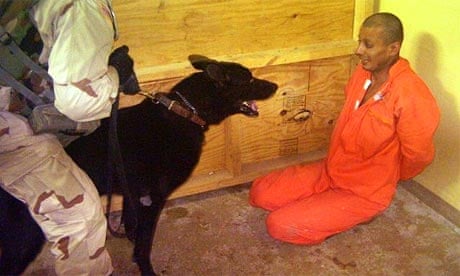The Obama administration is set to intensify the torture debate by releasing scores of new pictures showing abuse of prisoners held by the US in Iraq and Afghanistan.
The pictures were taken between 2001 and 2006 at detention centres other than Iraq's infamous Abu Ghraib prison, confirming that abuse was much more widespread than the US has so far been prepared to admit.
The Bush administration had repeatedly blocked through legal channels appeals from human rights groups for release of the pictures, which are held by the Army Criminal Investigation Division. But the Obama administration late yesterday lifted all legal obstacles and the pictures are to be published by 28 May.
The justice department has initially agreed to the release of 21 images of abuse at detention centres in Iraq and Afghanistan other than at Abu Ghraib and 23 other pictures. It added "the government is also processing for release a substantial number of other images". Up to 2,000 could be released.
The pictures are similar to those from Abu Ghraib that in 2004 created shock around the world, caused a backlash in the Middle East and eventually led to jail sentences for the US military personnel involved.
A US official said the pictures were not as bad as Abu Ghraib but "not good" either. The Abu Ghraib pictures showed Iraqi prisoners hooded, naked, posed in sexually embarrassing positions and being harassed by dogs.
The Obama administration is fighting to control the controversy that began last week when it released four Bush administration memos detailing torture techniques approved by the CIA.
Obama has consistently said he does not want to rake over history, fearing that it will deflect attention from his heavy domestic and foreign policy programme. But this week he opened the way for the prosecution of senior figures in the Bush administration and the establishment of a congressional inquiry.
Amid the uproar this created, he has since been backing off. Both he and the Democratic leader of the Senate, Harry Reid, have signalled their unwillingness to hold a truth commission, but the Democratic leader in the House, Nancy Pelosi, appears ready to push ahead. With so much clamour for an investigation, it is almost certain that Congress will hold one, with or without the backing of the White House.
The release of the pictures has been sought by the American Civil Liberties Union (ACLU), a human rights organisation whose legal action forced publication of the Bush administration memos under freedom of information.
The pictures will increase pressure for pardons for military personnel who were punished for abuses at Abu Ghraib. Their lawyers are arguing that the Bush administration portrayed it as an isolated incident, whereas in fact it was widespread and approved at the highest levels.
"This will constitute visual proof that, unlike the Bush administration's claim, the abuse was not confined to Abu Ghraib and was not aberrational," said Amrit Singh, a lawyer for the ACLU.
There is a risk the pictures might create another backlash in the Middle East, though it is more likely they will be seen in their historical context as belonging Bush era.
The Bush administration, in blocking release of the pictures, had argued that they would create outrage but also that they would contravene the Geneva conventions obligation not to show pictures of prisoners.
About a quarter of a million petitions were delivered to the attorney-general, Eric Holder, yesterday calling for prosecution of Bush administration officials responsible for approving waterboarding and other harsh interrogation methods.
